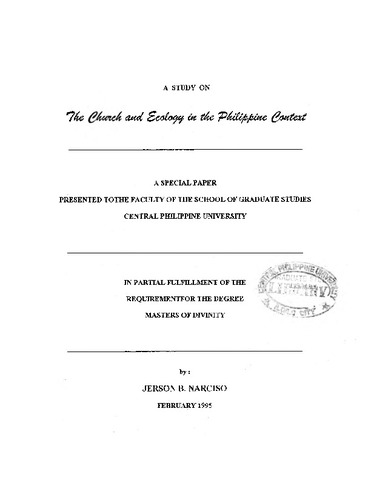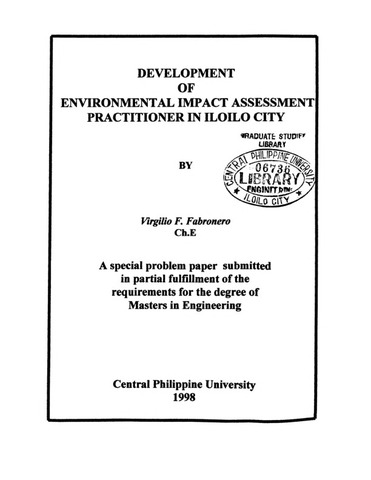A study on the church and ecology in the Philippine context

Page views
932Date
1995Author
Thesis Adviser
Defense Panel Chair
Share
Metadata
Show full item record
Abstract
The problem of environmental degradation is not anymore an isolated issue. This is now a global concern. People all over the world are very much aware of the seriousness of this problem. Locally and worldwide people are becoming more conscious of the fact that we share the same predicament because we are all aboard in one spaceship called earth, and what happens to a certain part of the world will certainly affect all the rest
No one can deny the fact that the environment of air, water and earth sustains and nurtures us, and as the environment deteriorates, life for all of us is endangered. Scientists have earlier warned us that environmental degradation has reached an alarming proportion that it will not take long when the planet earth would not be able to sustain life anymore. Not to do anything about environmental deterioration is tantamount to suicide.
One disturbing fact that should confront every Filipino today is the reality of the brokenness of our society. Today, as never before, we are faced with all sorts of problem known to man— the horror of grinding poverty, the seemingly endless graft and corruption both in the lower and higher echelon of our government, the paralyzing effect of foreign domination both on the political and economic life of our nation, and of course, the terrifying reality of ecological degradation which has reached a very alarming proportion.
In a DENR- sponsored seminar on ecology held in Iloilo City, an expert, Dr. Remegio Amador Jr. of the Development Academy of the Philippines gave the participants update on environment. He said that because of the extreme heat that we are experiencing now, the icebergs of the North Pole are starting to melt. This will cause a dramatic rise in the sea level. And this in turn will endanger islands and countries that are below sea level. He pointed out that these islands would gradually sink. He said that this could happen in the next 5 or 10 years. To make matters worse he remarked that Panay is one of these islands which are below sea level.
This is no alarmist or joker who is talking. This is someone who has scientific knowledge about the trends and threats to our world. The situation is serious. Maybe we do not as yet feel its precariousness, but never before has the need for restoring the wholeness of creation been more urgent.
The series of calamitous events that have plagued our country in the past five years are concrete manifestations of the seriousness of our problem— the devastating quake, the super typhoon, the scorching drought, the mudflows and the ashfalls from the vowels of Mt. Pinatubo and Mt. Mayon, the killer flood of Ormoc that swept some 8,000 people to their death. These are living legacies of our mindless and exploitative society today.
Everett Mendoza, a professor of New Testament Theology at Siliman University observes that these horrifying events have evoked theological questions that cut deep through the heart of the Christian Gospel. “If the God that we see in Jesus is a loving God, why does He allow all these to happen?” Again, Mendoza points out that varied responses from the church people have been forwarded to answer this question. On the one hand, the more secularized ones would regard these calamitous events as just mere natural events. They say that volcanoes do erupt and flashfloods occur at certain points in time and therefore, there is no good reason for attaching any theological meaning to it.
On the other hand, the more fanatical one say that it’s a sign of Christ’s second coming and the beginning of the millenium.
These are superficial answers that do not at all consider the serious implication of the problem in relation to the actual experiences of the people and what the Bible says about it. In this time of crisis, the church is caught unprepared to give a clear theological stand on the issue of ecological degradation which has become massive and rampant in our country and the world today.
The challenge of the contemporary ecological crisis in our country is the springboard for this study. I am convinced and I agree with Santmire, an American Christian environmentalist who asserts, "The roots of our ecological problem is not only political but to a large extent religious in nature.” He concludes, “The remedy must also be essentially religious whether we call that or not.”
Ms. Sharon Rose Joy Ruiz- Duremdes, regional coordinator of the Western Visayas Ecumenical Council shares the same thought when she said, “Today’s endangered environment reveals a spiritual crisis. Modern culture has come to understand the world apart from any reference to God and His original purpose in creation.”
Along with this, Shinn, a professor of Applied Christianity at Union Theological Seminary, New York, remarks that when the psalmist of old lifts up his eyes unto the hills, it would always remind him of his Creator. But today, when man lifts up his eyes unto the hills, he cannot think of God any more. Instead, he thinks of the minerals and timber that he can plunder from it.
Santmire strongly suggests “that today as never before we need an ecological theology that takes seriously the life of man in nature and the life of nature itself.”
Indeed, our time of crisis requires the church to formulate a clear theological stand on the issue that would allow our people to realize the serious consequences of the damage that human beings have inflicted upon nature, to see the inherent value of nature, and ultimately, the restoration of life in the whole of God’s creation.
This paper is intended towards that direction. However, this is to be regarded as the beginning of the journey, not the end of the journey itself For I know that no one can claim on this matter theological absoluteness. Yet, I believe that theology, like faith itself is a venture, a risk, and one must be willing to go into this quite difficult process in order to be able to make sense out of our chaotic situation.
Essential to achieving this purpose is: First, for us to know the actual picture of our ecological dilemma in the Philippines today. I have purposedly given special attention to problems related to our forest ecosystem and marine ecosystem, [although I have also discussed very briefly some other issues related to the problem of environment like higher population expansion and environmental pollution] for they show the most glaring evidence of our ecological problem; Second, an assessment of the life and nature of the church amidst ecological problems in our country today; Third, we need to look at the problem from the Biblical perspective; and Fourth, we need to come up with a program of ministry by which the church could get involved in the work of restoring God’s creation.
Description
Introduction
Suggested Citation
Narciso, J. B. (1995). A study on the church and ecology in the Philippine context (Unpublished Master’s special paper). Central Philippine University, Jaro, Iloilo City.
Type
Special paperSubject(s)
Department
School of Graduate StudiesDegree
Master of DivinityShelf Location
TheoLib Thesis 207.2 N165
Physical Description
38 leaves
Collections
- Master of Divinity [36]
Related items
Showing items related by title, author, creator and subject.
-
Development of environmental impact assessment practitioner in Iloilo City
Fabronero, Virgilio F. (1998)In early nineties, the DENR in coordination with the Commission of Higher Education (CHED) conducted a study on the inclusion of subject on environmental science in the school’s curriculum. Results of the study showed that, ... -
Stakeholders' assessment of carrying capacity and sustainability of Islas De Gigantes as a tourist destination: Inputs to a strategic development plan
Abioda, Kervin Marc D. (2023-12)This study aimed to determine the carrying capacity and sustainability of Islas de Gigantes as a tourist destination as assessed among the stakeholders and as inputs to a strategic tourism development plan. The study will ... -
Environmental awareness and practices of Grade 12 - Senior High School students of a private school in Iloilo City
Jandoquile, Julie Ann (Central Philippine University, 2019-04)This study was conducted to determine the level of environmental awareness and practices of Grade 12 Senior High School students of a private school in Iloilo City. The one shot survey design was used to gather data from ...




